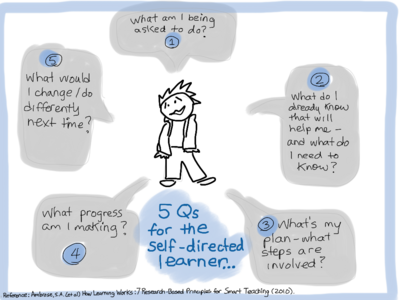Documentation:Learning Commons:Content/Myths About Learning/Myth 5 Planning
Myth 5: Planning is a waste of time.

Being a self-directed learner requires planning.
Answering the 5 questions from the graphic above can help to build a disciplined approach which will help you tackle your academic work.
Planning can also help you develop a workable schedule for studying. "Research shows spacing study episodes out with breaks in between study sessions or repetitions of the same material is more effective than massing such study episodes. Massing practice is akin to cramming all night before the test." (Clark and Bjork, 2014).
Planning reduces stress, helps you avoid cramming, and builds skills in metacognition. Planning is an important part of any career or occupation, so learning to plan well contributes to your overall competency. Even learning to plan takes practice, so start early!
Reference:
- Clark, C.M., Bjork, R.A. (2014) When and Why Introducing Difficulties and Errors Can Enhance Instruction, in Benassi, V. A., Overson, C. E., & Hakala, C. M. (Editors). (2014). Applying science of learning in education: Infusing psychological science into the curriculum. Available at the Teaching of Psychology website: http://teachpsych.org/ebooks/asle2014/index.php.